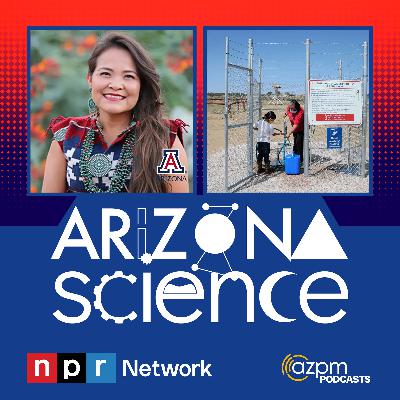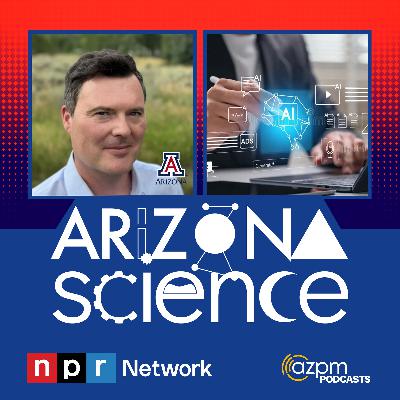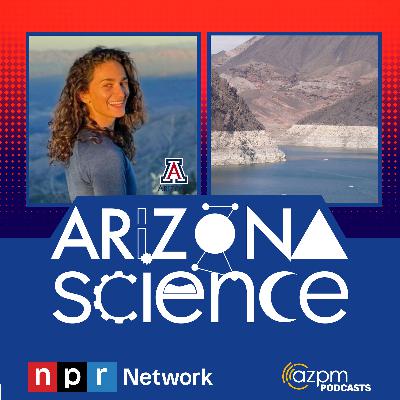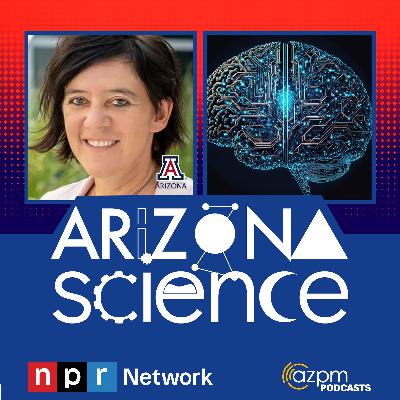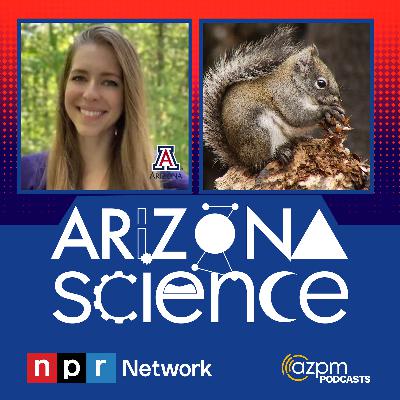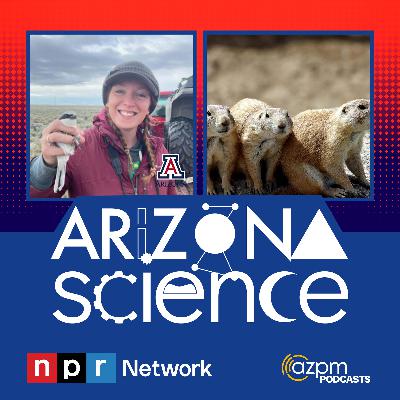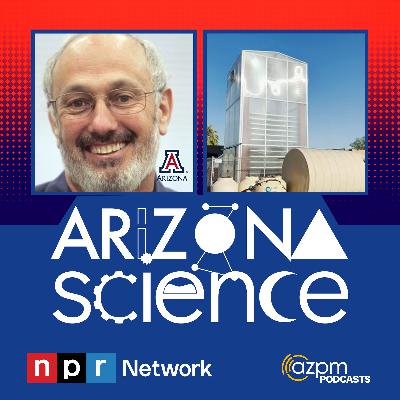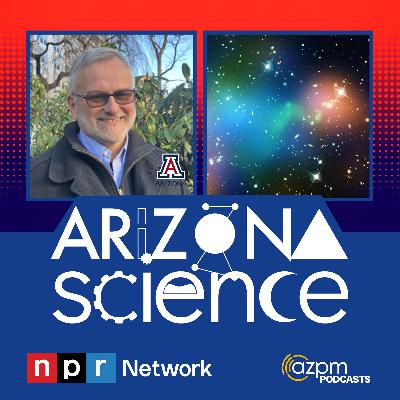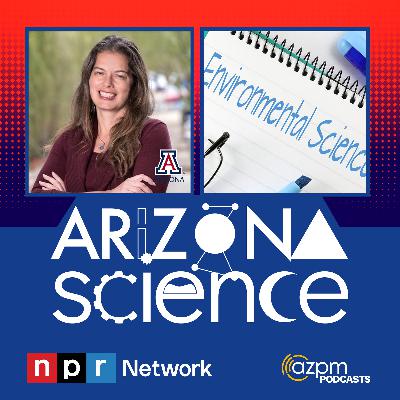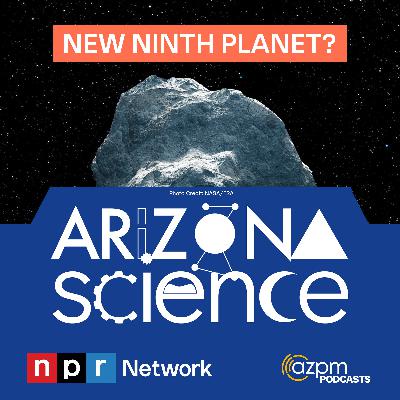Discover Arizona Science
Arizona Science

454 Episodes
Reverse
Seven states in the Colorado River basin failed to meet a key deadline February 14 on a plan to conserve their shared water supplies. University of Arizona Hydrology and Atmospheric Sciences professor Laura Condon talks about the difficult choices ahead for water management in Arizona amid the ongoing drought. Laura Condon spoke with Leslie Tolbert, Ph. D. Regents Professor Emerita in Neuroscience at the University of Arizona.
Plasma scientists investigate ionized gases and how they interact with various materials. University of Arizona mathematics professor Lise-Marie Imbert-Gerard is studying how waves of energy travel through plasma. The findings could help scientists improve nuclear fusion technology.Lise-Marie Imbert-Gerard spoke with Leslie Tolbert, Ph. D Regents professor emerita in Neuroscience at the University of Arizona.
Fruit flies have been crucial for researchers developing the basic principles of biology and disease. University of Arizona neuroscientist Martha Bhattacharya describes how the insects became pivotal instruments in learning about human genetics. Martha Bhattacharya spoke with Tim Swindle, professor emeritus of Planetary Science at the University of Arizona.
Many causes of death share the same common factor, the onset of advancing age. University of Arizona biologist George Sutphin describes how our understanding of aging could transform medicine in the future. He will be the first speaker in this year's College of Science free lecture series at Centennial Hall. George Sutphin spoke with Tim Swindle, professor emeritus in Planetary Science at the University of Arizona.
Sonoyta Pupfish are native to southern Arizona and listed as critically endangered. University of Arizona professor Peter Reinthal designed a project that brought the fish to Biosphere 2's Desert Biome habitat and give it a head start on survival. Peter Reinthal spoke with Tim Swindle, professor emeritus of Planetary Science at the University of Arizona.
Los Angeles firefighters battled the Palisades Fire in January 2025. University of Arizona environmental health researcher Melissa Furlong talks about a study looking at the challenges the firefighters are now facing, including changes in blood proteins that can lead to cancer. Melissa Furlong spoke with Tim Swindle, professor emeritus of Planetary Science at the University of Arizona.
We often hear about feelings that come from our gut. Researchers led by University of Arizona physiologist Maya Kaelberer are working to understand how our gut and brain communicate. Their studies could lead to new strategies for addressing diet-related diseases and more. Maya Kaelberer spoke to Leslie Tolbert, Ph. D Regent's professor emerita in Neuroscience at the University of Arizona.
The Trump administration is moving to dismantle some of the world's leading climate and weather research institutions. It's the latest result in the politicization of climate science. University of Arizona Environmental Science professor Kathy Jacobs explains how explaining climate science has turned increasingly difficult over the past several years. Kathy Jacobs spoke with Leslie Tolbert, Ph. D. Regent's professor in Neuroscience at the University of Arizona.
Scientists from around the world have spent two years examining material brought back to Earth from the asteroid Bennu by the University of Arizona-backed Osiris REx mission. U of A planetary scientist Jess Barnes discusses some of the findings from the Bennu samples, including how one of the minerals resembles ordinary kitchen table salt. Jess Barnes spoke with Tim Swindle, professor emeritus of Planetary Science at the University of Arizona.
Many tribal communities are using sustainable practices associated with their culture, but water access is still an issue. University of Arizona environmental professor Karletta Chief discusses how tribes are adapting to drought conditions and ensuring there's enough water for farms and homes. Karletta Chief spoke with Leslie Tolbert, Ph.D Regent's professor in Neuroscience at the University of Arizona.
The rapid influence of artificial intelligence is making choice-making behavior more important than ever. University of Arizona marketing professor Martin Reimann discusses how potential consumers who can detect AI in advertising are less likely to choose those products over others. Martin Reimann spoke with Leslie Tolbert, Ph. D. Regent's professor emerita in Neuroscience at the University of Arizona.
Scientists are learning about the current drought in the Southwest by studying climate change in the past. University of Arizona researcher Ellie Broadman discusses drought evidence found in tree rings that show what happened in the jet stream before man-made global warming took place. Ellie Broadman spoke with Tim Swindle, professor emeritus in Planetary Science at the University of Arizona.
Generative artificial intelligence is emerging as a tool to look at how people learn language. University of Arizona professor Gondy Leroy discusses research into how advanced machine learning can help families diagnose autism through the way their children acquire speaking skills. Gondy Leroy spoke with Leslie Tolbert, Ph. D. Regent's professor in Neuroscience at the University of Arizona.
Squirrels are notorious for being somewhat anti-social creatures. A team of researchers is trying to understand how the animals share crucial microbes that keep them healthy. University of Arizona evolutionary biologist Lauren Petrullo discusses the behavior of squirrels that leads to microbial exchange. Lauren Petrullo spoke with Tim Swindle, professor emeritus of Planetary Science at the University of Arizona.
People have spent decades trying to find a way to measure the dimension of imagination. University of Arizona neuroscientist Jessica Andrews-Hanna discusses what happens in our brains when we find ourselves lost in thought, or when we develop brand new ideas. Jessica Andrews-Hanna spoke with Leslie Tolbert, Ph.D. Regent's professor emerita in Neuroscience at the University of Arizona.
Firefighters have found extensive underground burrows dug by prairie dogs helped them halt the advance of wildfires in some Western states. University of Arizona researcher Courtney Duchardt discusses data suggesting prairie dog colonies can alter landscapes and reduce wildfire spread and intensity. Courney Duchardt spoke with Tim Swindle, professor emeritus of Planetary Science at the University of Arizona.
Tens of billions of pounds of wasted food ends up in landfills in the United States each year. University of Arizona professor Goggy Davidowitz is leading a team developing a system that collects food waste and dries it in a vertical greenhouse, so it can be used to fertilize fields and feed livestock. Goggy Davidowitz spoke with Tim Swindle, professor emeritus of Planetary Science at the University of Arizona.
Researchers know dark matter exists in the universe, but the evidence is hard to find. University of Arizona astronomy professor Dennis Zaritsky explains how scientists are exploring the space between galaxies to resolve this decades-old mystery. Dennis Zaritsky spoke to Tim Swindle, professor emeritus of planetary science at the University of Arizona.
An organization that helps researchers win grants for their work on the University of Arizona campus nearly shut down because of the Trump administration's funding freeze earlier this year. BRISA Center for the Environment director Paloma Beamer discusses how it is continuing its mission despite losing support from the federal government. Paloma Beamer spoke with Leslie Tolbert, Ph. D Regent's professor emerita in Neuroscience at the University of Arizona.
It's been almost 20 years since Pluto lost its status as the ninth planet in our solar system. Now astronomers think they have identified a candidate to take its place. Katherine Volk with the Tucson-based Planetary Science Institute discusses a rare object that is orbiting the sun in step with the eighth planet, Neptune. In this extended episode, Katherine Volk spoke with Tim Swindle, professor emeritus in Planetary Science at the University of Arizona.











